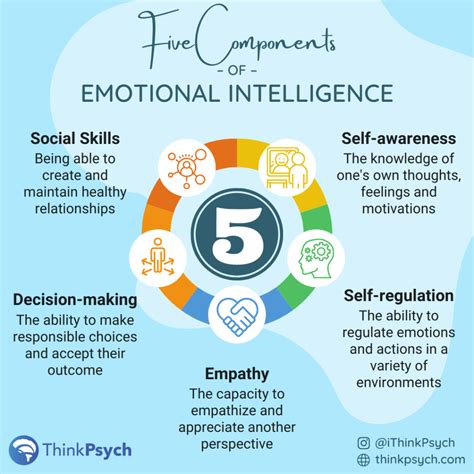Emotional Intelligence (EI) – “The Ability to Perceive, Use, Understand, Manage, and Modify Our Own and Others’ Emotions.” – John Mayer & Peter Salovey

Emotional intelligence is a crucial concept in the field of psychology, particularly in the Advanced Placement (AP) Psychology curriculum. It encompasses the ability to identify, understand, manage, and utilize emotions effectively. This skill set plays a vital role in personal, academic, and interpersonal success.
Components of Emotional Intelligence
The AP Psychology framework identifies five key components that contribute to emotional intelligence:
- Self-Awareness: The ability to recognize and label one’s own emotions, as well as their impact on thoughts and behaviors.
- Self-Regulation: The capacity to control and manage one’s own emotions, preventing impulsive or inappropriate responses.
- Motivation: The ability to use emotions as a driving force for personal growth, achievement, and goal attainment.
- Empathy: The ability to understand and share the emotions of others, fostering social connection and understanding.
- Social Skills: The ability to build and maintain positive relationships, navigate interpersonal conflicts, and communicate effectively.
Emotional Intelligence and Academic Success
Research consistently demonstrates the positive correlation between emotional intelligence and academic achievement. Students with higher emotional intelligence tend to:
- Experience reduced stress and anxiety
- Exhibit improved motivation and self-discipline
- Develop stronger relationships with teachers and peers
- Achieve higher grades and test scores
Emotional Intelligence and Career Success
In the professional realm, emotional intelligence is highly valued and sought after by employers. Individuals with strong emotional intelligence are more likely to:
- Advance in their careers
- Lead and manage effectively
- Build and maintain strong professional relationships
- Negotiate effectively
- Handle stress and adversity with resilience
Building Emotional Intelligence
Emotional intelligence is not a fixed trait; it can be developed and enhanced through practice and effort. Here are some strategies to build emotional intelligence:
- Practice Self-Reflection: Pay attention to your emotions, identify their triggers, and explore their consequences.
- Develop Coping Mechanisms: Identify healthy ways to manage stress, anxiety, and other challenging emotions.
- Seek Feedback from Others: Ask trusted friends, family, or professionals for feedback on your emotional expression and interpersonal skills.
- Engage in Perspective-Taking: Try to see situations from multiple perspectives, including those of others.
- Practice Active Listening: Listen attentively to others, showing empathy and understanding.
Table 1: Benefits of Emotional Intelligence for Students
| Benefit | Explanation |
|---|---|
| Reduced Stress and Anxiety | EI helps individuals cope with stress and anxiety, reducing the negative impact on academic performance. |
| Improved Motivation and Self-Discipline | EI empowers individuals to set goals, stay motivated, and overcome challenges. |
| Stronger Relationships with Teachers and Peers | EI fosters positive social interactions, leading to stronger relationships and a supportive learning environment. |
| Higher Grades and Test Scores | EI promotes focus, concentration, and the ability to perform effectively under pressure. |
Table 2: Emotional Intelligence and Career Success
| Attribute | Outcome |
|---|---|
| Enhanced Leadership and Management | EI enables individuals to lead and manage others effectively, building strong teams and driving results. |
| Improved Professional Relationships | EI promotes positive and collaborative relationships with colleagues, clients, and stakeholders. |
| Effective Negotiation | EI allows individuals to understand and manage their own emotions and those of others, facilitating successful negotiation outcomes. |
| Stress and Adversity Resilience | EI equips individuals with coping mechanisms and emotional resilience, enabling them to handle stress and adversity effectively. |
Table 3: Strategies for Building Emotional Intelligence
| Strategy | Description |
|---|---|
| Practice Self-Reflection | Regularly take time to identify and understand your own emotions. |
| Develop Coping Mechanisms | Identify and implement healthy ways to manage stress and challenging emotions. |
| Seek Feedback from Others | Ask trusted individuals for feedback on your emotional expression and interpersonal skills. |
| Engage in Perspective-Taking | Try to see situations from multiple perspectives, including those of others. |
| Practice Active Listening | Listen attentively to others, demonstrating empathy and understanding. |
Table 4: Tips for Enhancing Emotional Intelligence in the Classroom
| Tip | Explanation |
|---|---|
| Create a Safe and Supportive Environment | Establish a classroom culture where students feel comfortable expressing and discussing their emotions. |
| Integrate Social-Emotional Learning (SEL) | Incorporate SEL activities into lessons to teach students about emotions, self-regulation, and empathy. |
| Provide Opportunities for Reflection | Encourage students to reflect on their emotions, experiences, and behaviors. |
| Model Emotional Intelligence | Teachers should demonstrate emotional intelligence by managing their own emotions and interacting with students respectfully. |
| Seek Support from Colleagues | Collaborate with other teachers and professionals to gain insights and support in fostering emotional intelligence. |
Conclusion
Emotional intelligence is a vital skill that underpins success in various aspects of life. By understanding and developing emotional intelligence, individuals can unlock their full potential, achieve academic excellence, thrive in their careers, and establish meaningful relationships. AP Psychology provides a comprehensive framework for understanding and enhancing emotional intelligence, empowering students to become emotionally literate and well-rounded individuals.
